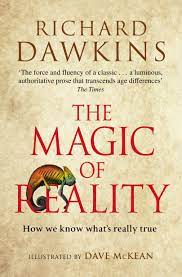
Richard Dawkins: The Magic of Reality
Review by Rae West - 19 March 2021
How Do We Know What's Really True?Rather slackly, I see I didn't record the publishing histories of some of Dawkins' books. My edition of The Magic of Reality is the 2012 paperback, 'A Black Swan Book', with illustrations copyright Dave McKean, though in fact there are almost none. The 'fully illustrated hardback edition' was first published in Britain in 2011.
A reviewer said the book is 'primarily aimed at teenagers' (though the book itself seems not to say that) and there is praise for Dawkins on genes, statistics, tectonic plates, rainbows and so on. And indeed it does seemed aimed at young people. 'Things I never understood were made clear for the first time', says Philip Pullman. Whoever he is, or was.
But it doesn't matter what I think; the question is only whether the book appealed to young people, and perhaps had a serious beneficial impact on some of them. Every serious thinker must have had some influence from outside, after all. This is probably not a question answerable at present. However, my impression is that Dawkins made some effort to weed out pseudo-science and also, what is increasingly recognised, scientific frauds and hoaxes. He may have aimed his book at the next generations of scientific thinkers, not the vast numbers of Jew-promoted charlatans.
This book is of the same type as most scientific books from Victorian times to the present day. Dawkins looks at established science, and describes it; and this isn't as easy as it perhaps sounds. He has 12 chapters, the first and last being philosophical—the senses, and the necessity for one or more brains, and the invention and use of instruments such as telescopes. (Dawkins avoids the tricky ones: no electron microscopy, no mass spectrometry, no nuclear-magnetic resonance and its name-change, for example).
Chapter 12 looks at miracles, starting with Hume. And Chapter 11 is 'Why Do Bad Things Happen?' which partly looks at probability, though formal statistics isn't really present. The other ten look at the solar system&mdashdays, seasons, years—physical chemistry without that name, earthquakes, and of course biology and evolution.
Dawkins gives Darwin full priority over evolution; poor old Alfred Russel Wallace get no look-in. We have some speculation, e.g. on DNA, whether the universe holds other forms and types of vision, and whether other body types might exist. For 2010, I was pleased to see Dawkins has avoided major scientific frauds. Nothing special on CO2 or 'climate change'; nothing on NASA and the 'moon landing' fraud; nothing on superfluids; nothing much on nuclear weapons or power; nothing on relativity, though we have relative motion; nothing on 'AIDS'—of course this is far before 'COVID'; nothing on 'racism' though this must have been a strain. There are novelties: the biggest star used to be Betelgeuse, for example, supplanted by VY Canis Majoris.
I thought I'd detected two mistakes: marsh gas isn't methane, or at least includes phosphine for ignition. And (p 128) a football in a field, with a peppercorn 25 metres away representing the earth. This looked wrong to me, but it's OK. There's something else, so common I'm not sure it counts as a mistake, which is to assume that the senses are about the same. But after all there are great complexities in (say) vision and hearing and smells, and nerves and the brain; why shouldn't different people sense things differently? Red-green colour blindness being an important example. What's 'really true' even with what looks simple enough has a lot of wiggle room.
As with modern science works, there's nothing much on the downsides. What about weaponry, high explosives, and latent dangers—is it possible that the vast use of pesticides acting on the nervous system might induce long-term brain damage; of the 'mad cow disease' type?
And there's nothing much on science frauds, though Dawkins seemed to have weeded quite carefully, and nothing much on fakery, forgery, financial taking over of inventions, media lies, and other topics. These, in future, if science continues, must become a large topic. And the lessons will be projected back into the past. This needs judgment and genuine intelligence; Dawkins is somewhat like an advertiser who believes he's giving informational advertising. The other sort of advertising is suppressed.
Not for the first time I'm impressed by the difficulty of explaining many things. Take 'gravitation' for example. And the idea that a cannon shooting horizontally has a ball with a constant downward acceleration. Until Newton, this was missed by everyone and I simply don't believe the stories promoted typically by Jewish 'educators' that simple types can see it.
Dawkins evidently likes quoting mythical stories, and we have collections from (I presume—no bibliography) assorted historical and anthropological sources. They include stories of 'alien abduction' from the USA; Dawkins manages to be polite. He acknowledges more than thirty people, and seems to have tested his material on schoolchildren.
I'm half-inclined to think of this book as possible home-schooling text. This might explain Dawkins' caution about science frauds like the 'moon landings'. I'm reminded (from an online talk between Nick Griffin, once of the BNP, and Andrew Carrington Hitchcock) that Griffin said that Sweden had not liked lockdowns, because Swedish home-schoolers might teach intelligent revisionist material. Or at least that's what he hinted—Griffin's whole career was built on tantalising suggestions, not revealing all he knew. Obviously, US flyover state home-schooling would be silly Jewish stories.
Alfred Russel Wallace speculated about life after death and vaccination and economics. We may reasonably expect that psychology will be represented in future; children have to be exposed to some of the more fantastical experiments, I suppose. I hope future generations will be more switched on to historical evidence, including such things as the spreading of religions, the 'Holocaust', and the question of whether avoidance of lies is possible. Dawkins as yet is too amateur for anything like that.